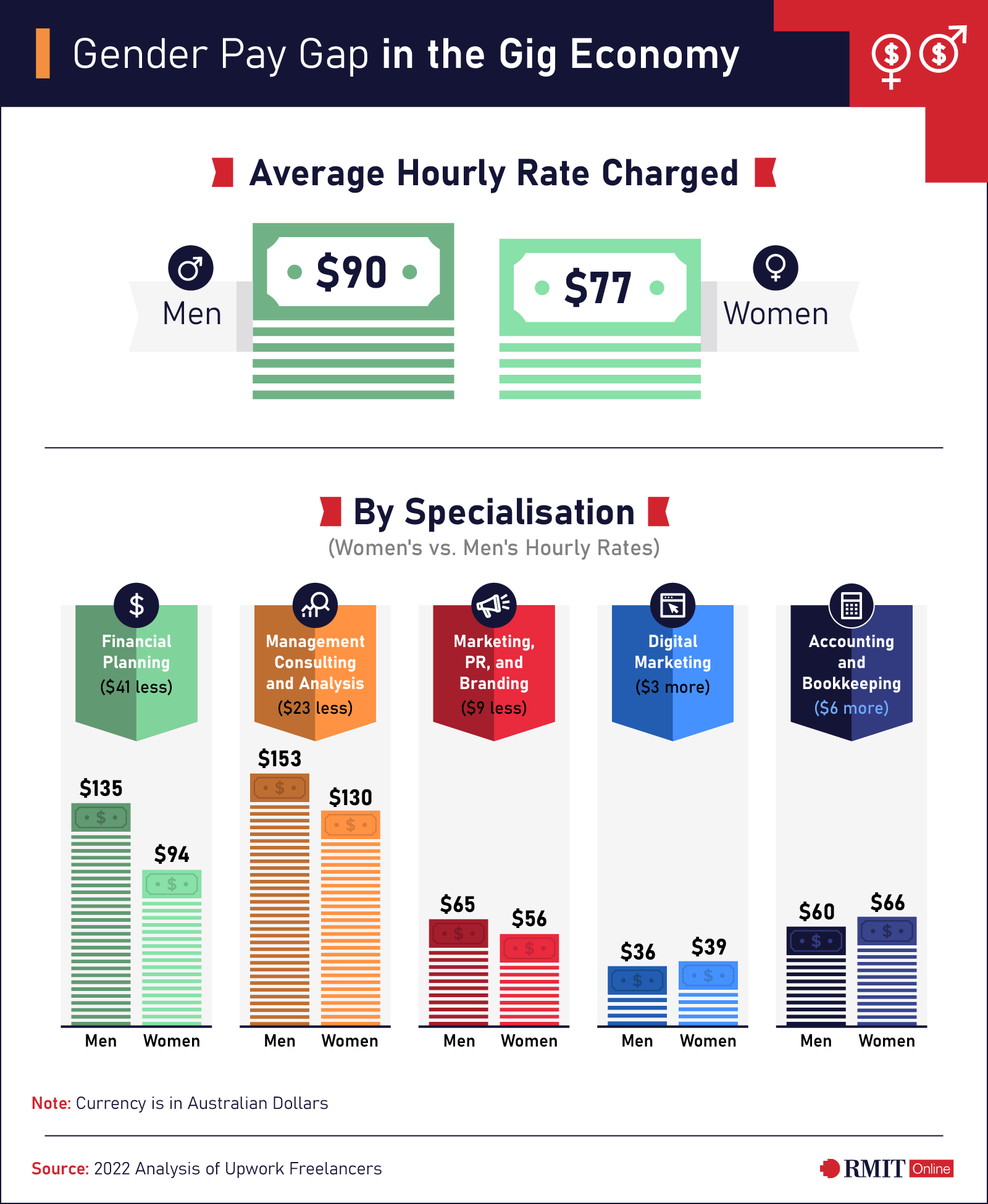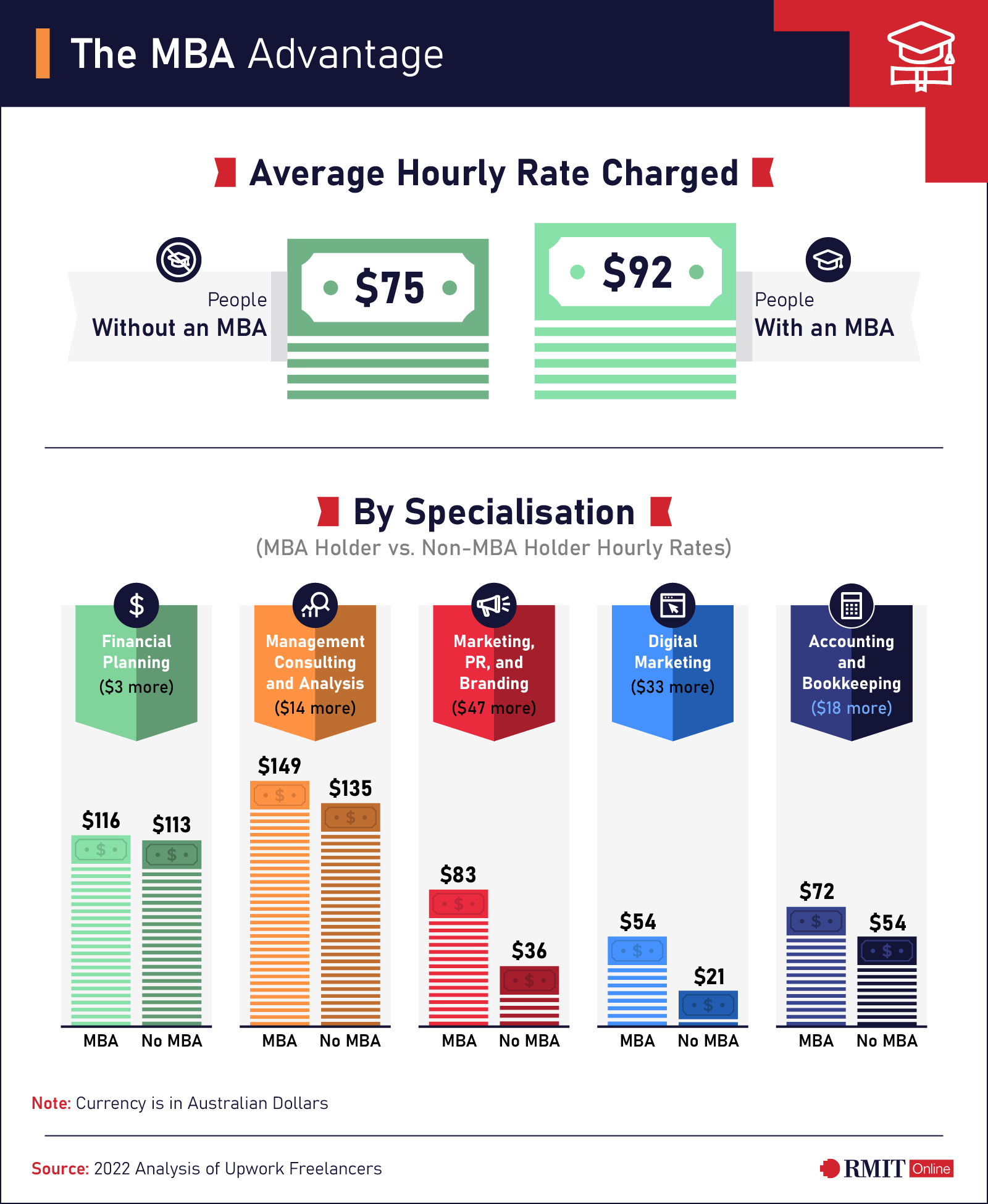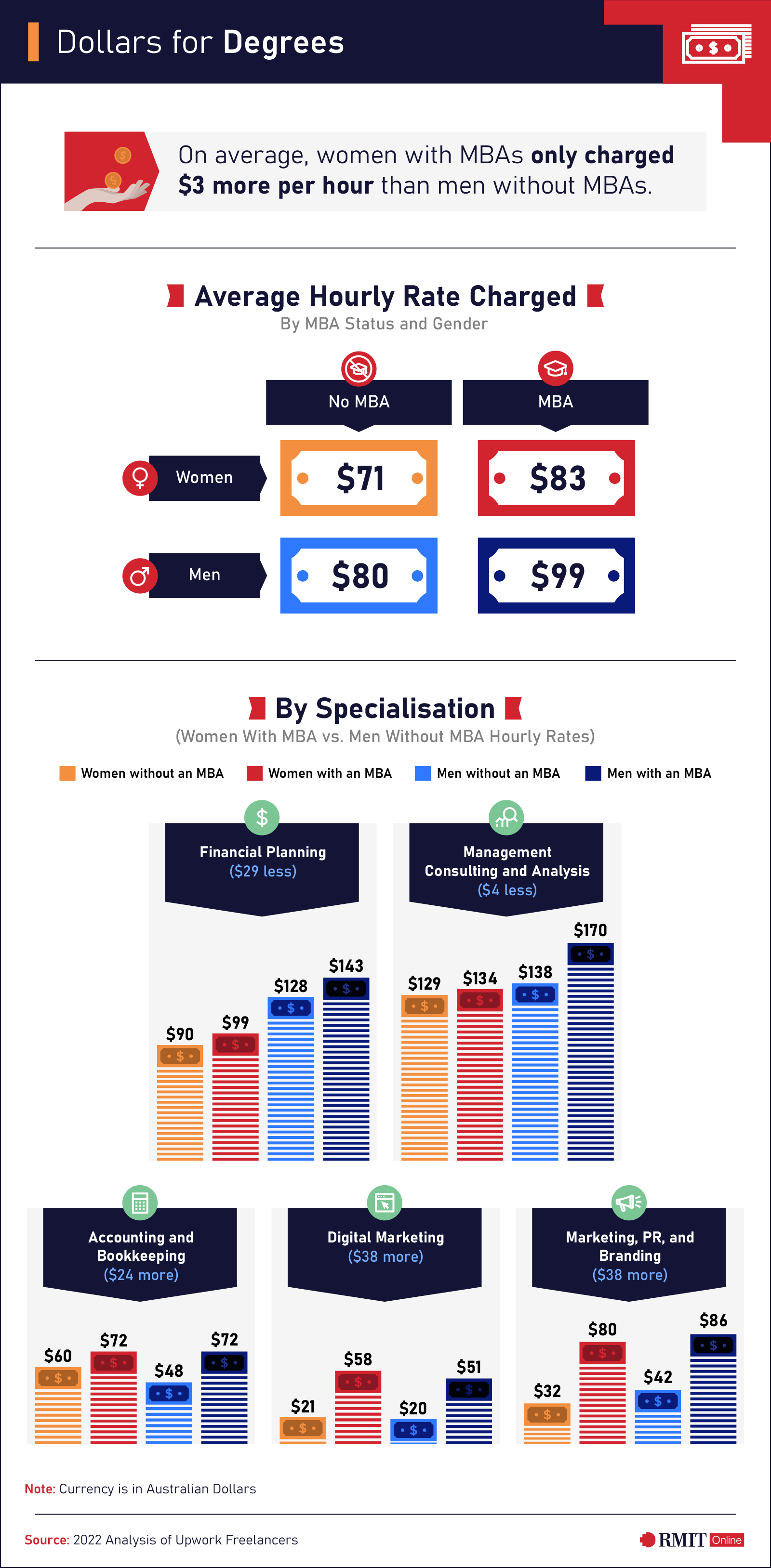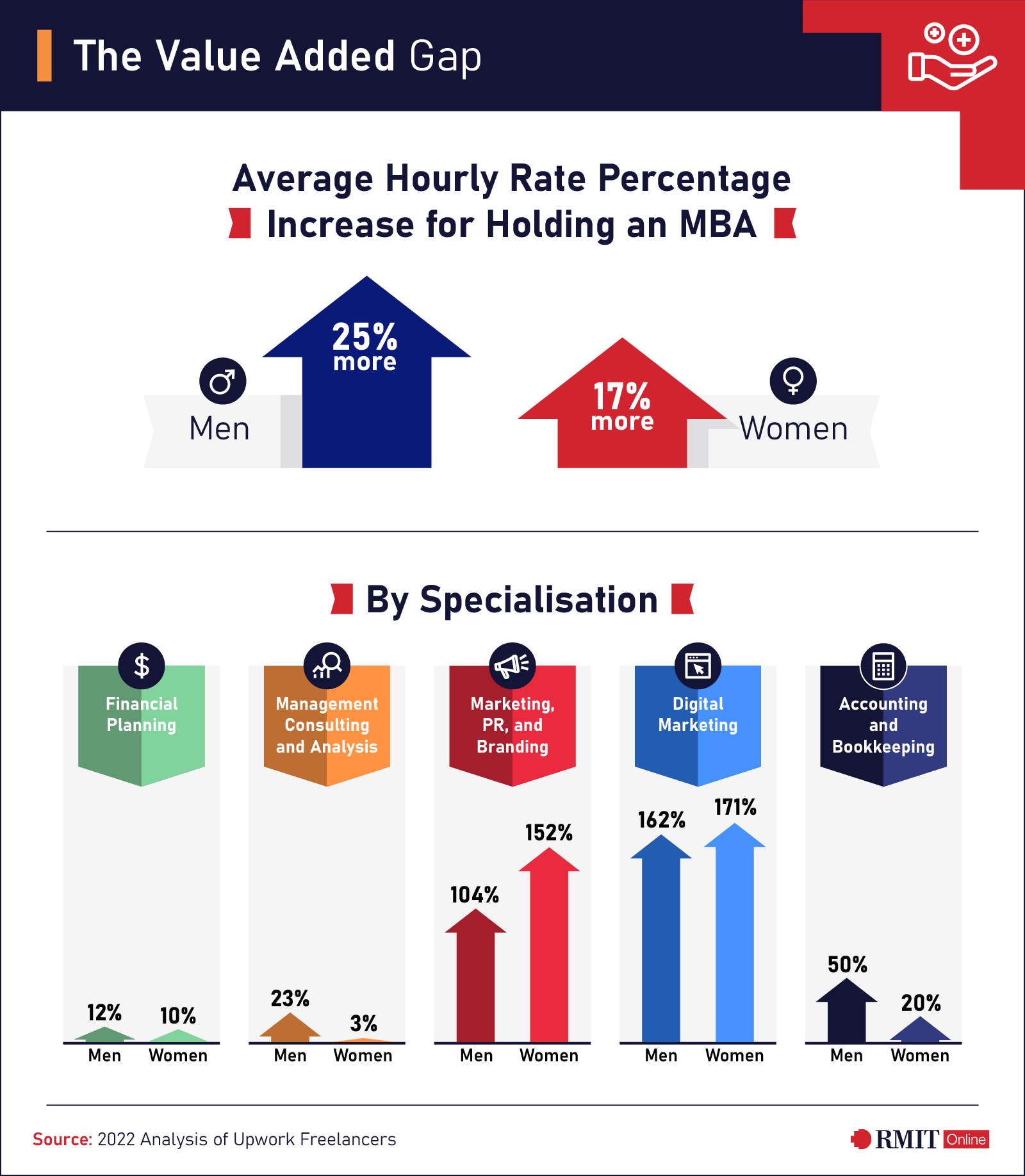The freelancer pay gap: MBA edition
Key takeaways
- People with MBAs earned AU$34,452 ($22,880 USD) more annually than those without.
- Women with MBAs charge an average of AU$12 ($8 USD) more an hour than women without MBAs.
- On average, women with an MBA only charge AU$3 ($2 USD) more per hour than men without an MBA.
- Men with MBAs charge an average of 25 per cent more per hour, while women with MBAs charge 17 per cent more.

Mind the gap (in the gig economy)
The latest national salary data from the Workplace Gender Equality Agency reveals that women's annual salaries are 14.1 per cent less than men's. But what about people who freelance? They determine their own hourly rates, so is there a greater chance for equality among the sexes in the gig economy?
Unfortunately, a recent analysis of 1,000 freelancers across five business-related categories on Upwork uncovered a similar trend: On average, men still tend to earn more by the hour, even in industries where workers set their own rates. Read on to learn which specialties have the largest pay discrepancies and which ones offer the most financial gains to those holding a Master of Business Administration (MBA).
Fractures among freelancers
Our study begins with an analysis of the average hourly rate difference between men and women. We then broke the data down further into five categories: financial planning, management consulting, traditional marketing, digital marketing, and accounting.

Infographic transcript
Gender pay gap in the gig economy
There is a significant pay gap between men and women in the gig economy, with the average hourly rate for men being $90 AUD and women being $77 AUD. This pay gap can also be seen by specialisation:
- Financial Planning: Men receive an average of $135 AUD per hour, whereas women receive an average of $94 AUD per hour, resulting in $41 AUD less per hour for women than men
- Management Consulting and Analysis: Men receive an average of $153 AUD per hour, whereas women receive an average of $130 AUD per hour, resulting in $23 AUD less per hour for women than men
- Marketing, PR and Branding: Men receive an average of $65 AUD per hour, whereas women receive an average of $56 AUD per hour, resulting $9 AUD less per hour for women than men
- Digital Marketing: Men receive an average of $36 AUD per hour, whereas women receive an average of $39 AUD per hour, resulting in $3 AUD more per hour for women than men
- Accounting and Bookkeeping: Men receive an average of $60 AUD per hour, whereas women receive an average of $66 AUD per hour, resulting in $6 AUD more per hour for women than men
Note: Currency in Australian Dollars
Source: 2022 Analysis of Upwork Freelancers
The most significant pay discrepancy was among freelance financial planners, with women earning an average of AU$40 ($27 USD) less per hour than their male counterparts. The next greatest difference was in management consulting and analysis, where men earned AU$23 ($15 USD) more per hour. The final sector in which being male appeared to be more lucrative was marketing, public relations, and branding: a field where men typically earned AU$9.34 ($6 USD) more per hour than women.
Women earned higher hourly wages in just two of the five categories. Women digital marketers made AU$3 ($2 USD) more per hour than men, and female accountants and bookkeepers charged AU$6 ($4 USD) more an hour. Among the three specialisations in which men commanded higher pay, they made an average of AU$24 ($16 USD) more hourly. In the two specialisations that women dominated, they only made AU$5 ($3 USD) more on average — a much smaller discrepancy.
An MBA's effect on earnings
Having seen the difference between men's and women's earnings, we next looked at how education affected those numbers. It's safe to assume that an MBA might bring in more money, but how much more?

Infographic transcript
The MBA advantage
The average hourly rate charged for people without an MBA is $75 AUD, whereas people with an MBA receive $92 AUD. This is also seen by specialisation:
- Financial Planning: An MBA holder receives on average $116 AUD per hour, whereas a non-MBA holder receives $113 AUD per hour, resulting in a gap of $3 AUD per hour
- Management Consulting and Analysis: An MBA holder receives on average $149 AUD per hour, whereas a non-MBA holder receives $135 AUD per hour, resulting in a gap of $14 AUD per hour
- Marketing, PR and Branding: An MBA holder receives on average $83 AUD per hour, whereas a non-MBA holder receives $36 AUD per hour, resulting in a gap of $47 AUD per hour
- Digital Marketing: An MBA holder receives on average $54 AUD per hour, whereas a non-MBA holder receives $21 AUD per hour, resulting in a gap of $33 AUD per hour
- Accounting and Bookkeeping: An MBA holder receives on average $72 AUD per hour, whereas a non-MBA holder receives $54 AUD per hour, resulting in a gap of $18 AUD per hour
Note: Currency in Australian Dollars
Source: 2022 Analysis of Upwork Freelancers
As we assumed, having an MBA provided an advantage regarding pay. Freelancers with MBAs earned an average of 22 per cent more hourly than those without the degree. In every category we analysed, MBA graduates charged more for their services, though some sectors saw bigger differences than others.
In particular, marketing, public relations, and branding professions saw a significant increase of AU$47 ($31 USD) per hour among those with MBAs. With the lowest pay at AU$36 ($24 USD) per hour and the maximum at AU$83 ($55 USD), that's a major income boost. Digital marketing also stood out, with a AU$33 ($22 USD) dollar discrepancy between those with and without the MBA credential. The most uniform hourly rate between the five specialisations was in finance. Financial planners with MBAs only saw a AU$3 ($2 USD) increase in wages.
We also wanted to see if there were any differences between an MBA's effect on women's pay versus men's. To find out, we split each profession by gender and education level:

Infographic transcript
Dollars for degrees
On average, women with MBAs are only charged $3 AUD more per hour than men without MBAs. Average hourly rate charged by MBA and Gender:
- Women with no MBA receive $71 AUD per hour, whereas women with an MBA receive $83 AUD per hour
- Men with no MBA receive $80 AUD per hour, whereas men with an MBA receive $99 AUD per hour
Women with MBA vs. men without MBA hourly rates by specialisation:
Financial Planning
- Women with an MBA receive $99 AUD per hour, whereas men without an MBA receive $128 AUD per hour, resulting in a gap of $29 AUD less per hour
Management Consulting and Analysis
- Women with an MBA receive $134 AUD per hour, whereas men without an MBA receive $138 AUD per hour, resulting in a gap of $4 AUD less per hour
Accounting and Bookkeeping
- Women with an MBA receive $72 AUD per hour, whereas men without an MBA receive $48 AUD per hour, resulting in a gap of $24 AUD more per hour
Digital Marketing
- Women with an MBA receive $58 AUD per hour, whereas men without an MBA receive $20 AUD per hour, resulting in a gap of $38 AUD more per hour
Marketing, PR and Branding
- Women with an MBA receive $80 AUD per hour, whereas men without an MBA receive $52 per hour, resulting in a gap of $38 AUD more per hour
Note: Currency is in Australian Dollars
Source: 2022 Analysis of Upwork Freelancers
Separating the data by gender showed a clear imbalance in pay scales. Previous studies show that women with MBAs make less than men with MBAs, and our research brought us to the same conclusion (though with a narrower gap). Female freelancers with MBAs made about AU$83 ($55 USD) per hour, while male freelancers with MBAs made AU$99 ($66 USD) — a 20 per cent difference. Women with MBAs also only made AU$3 ($2 USD) more per hour than men without MBAs. That's not much of an increase after putting in the work and expense of earning a higher degree.
Still, having an MBA helped women freelancers in all five specialisations earn more than those without one. The increases were quite substantial in some cases. For instance, female marketing, PR, and branding freelancers with MBAs earned AU$48 ($32 USD) more per hour compared to those without — that's an annual increase of AU$100,226 ($66,560 USD).
The two largest wage gaps between men and women with MBAs were in financial planning and management consulting and analysis. To make matters worse, even the men without MBAs in these fields still made more than the MBA-holding women. On the other hand, accounting and bookkeeping freelancers with MBAs earned equal pay, regardless of gender.
Bridging the Gap with Education?
Though we saw differences between the genders, MBA graduates within each gender made more money than their coworkers in the same field. Let's now look at how hourly rates rose percentage-wise for men and women across all five industries we researched.

Infographic transcript
The value added gap
The average hourly rate percentage increase for holding an MBA for men is 25% more, whereas for women it's only 15% more. By specialisation:
Financial Planning: The average hourly rate percentage increase for holding an MBA for men is 12% more, whereas for women it's 10% more
Management Consulting and Analysis: The average hourly rate percentage increase for holding an MBA for men is 23% more, whereas for women it's 3% more
Marketing, PR and Branding: The average hourly rate percentage increase for holding an MBA for men is 104% more, whereas for women it's 152% more
Digital Marketing: The average hourly rate percentage increase for holding an MBA for men is 162% more, whereas for women it's 171% more
Accounting and Bookkeeping: The average hourly rate percentage increase for holding an MBA for men is 50% more, whereas for women it's 20% more
Source: 2022 Analysis of Upwork Freelancers
When men received their MBAs, they saw significant increases in some specialisations, capping their average hourly rate increase at 25 per cent. And while women received only a 17 per cent increase overall, it was substantially more in some fields. In marketing, PR, and branding, women reported a 152 per cent increase in average pay after earning their MBAs, compared to just 104 per cent for men. Women also held the lead in digital marketing, with 171 per cent higher pay post-MBA compared to men's 162 per cent. Financial planning had the smallest gap of all five specialisations: a difference of just two percentage points between women and men.
Creating equality for freelancers
The roots of the gender pay gap run deep. We found that the male-dominated industries with the greatest wage disparities between genders (such as financial planning) are also the ones displaying gender bias against clients. This hints that traditional, outdated thinking holds women back financially not only in their profession but in managing their finances as well.
Though some industries need to catch up, getting an MBA is a step in the right direction since it's still highly likely to increase your income. But as women work to bridge the gap by increasing their average pay across the board, employers must also work to help make that happen. In the meantime, the good news is that newer specialisations like digital marketing appear to be levelling the playing field for female professionals of future generations.
Methodology
The data for this project comes from an analysis of 1,000 freelancers in five business-related categories on Upwork. Each category featured 100 women and 100 men. Additionally, each category had 100 freelancers with an MBA and 100 freelancers without an MBA. All conversions to Australian dollars were completed on November 22.
Discover RMIT Online's Master of Business Administration
RMIT Online's globally-recognised online MBA will provide you with the business and leadership skills you need to thrive in the rapidly changing business world.
With RMIT Online's cutting-edge insights into the worlds of technology, innovation and design, you'll gain a contemporary leadership mindset that will give you a critical advantage over traditional MBA graduates.
Learn more about RMIT Online's Master of Business Administration today.
Fair Use Statement
Want to share this information with a friend or colleague? Anyone can use our findings for noncommercial purposes as long as they provide a link back to this page.





